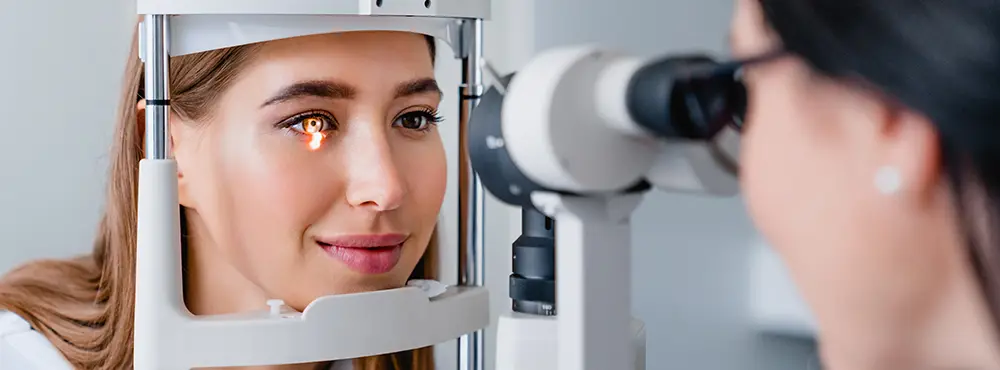What is drusen?
Drusen or retinal drusen are yellow-coloured spots under the retina, made up of fatty proteins. The retina is a thin layer of tissue at the back of the eye. Drusen can be described as tiny pebbles that build up over time. This condition will not cause blindness but can result in central vision loss if not treated in time. Apart from retinal drusen, drusen can also develop in the optic nerve.
Types of drusen
There are two types of drusen – soft and hard.
Soft drusen are bigger in size and are clustered closer together. This type of drusen possesses a higher risk of vision loss in the future.
Hard drusen are yellow coloured, comparatively smaller and more spread-out spots. Hard drusen usually do not cause any problems and have a lower risk of vision loss.
As you age, having a few hard drusen is normal and is not problematic.
On the other hand, age-related macular degeneration (AMD), a common eye condition, is said to be associated with soft drusen. This condition is common in people over 60. Soft drusen might not cause any problems at the initial stage, but with time, as they grow in size, they can cause bleeding and scarring in the cells of the macula. The macula is in charge of processing what you see directly in front of you, helping with central vision. As so, when the macula is affected, naturally, your central vision starts to deteriorate.
What causes drusen in eyes?
Drusen in eyes occur naturally with age. Usually, people over 60 will experience this condition.
A fact about retinal drusen by the Optometrists Network is that dry macular degeneration is responsible for 90% of drusen. Wet macular degeneration is responsible for the remaining 10% of drusen.
Dry macular degeneration makes your central vision blurry because of thinning of the macula, causing you to lose vision slowly.
Wet macular degeneration is caused when a blood vessel breaks, bleeds, or leaks fluid into the macula, making your vision blurry or giving you blind spots. Regular examination is important to detect such eye conditions.
Symptoms of drusen
This condition doesn’t usually cause symptoms and is detected through a routine eye examination. If your optometrist finds a lot of small drusen in your retina, they will run additional tests to check for age-related macular degeneration. Symptoms might include:
- Blank spot in the central vision
- Blurry vision
- Difficulty in adapting from bright conditions to low lit/dark conditions, such as when entering a dimly lit room from sunlight
- Difficulty with night vision
- Metamorphopsia – when a person sees straight lines as wavy
Drusen risk factors
Most common in women and people of Caucasian descent, risk factors of this condition include the following:
- Gender – females are more prone to this condition
- Family history – if anyone in your family had/has AMD, this could make it possible for you to carry the same condition
- Smoking – affects the macula causing AMD
- Abnormal cholesterol levels
- Age – people over 60 are more prone to this condition
- Cardiovascular diseases
- Obesity
How to treat retinal drusen?
Hard drusen do not require any treatment. There is no concrete treatment for soft drusen too, however, certain measures can be taken to control macular degeneration.
1. Consume vitamins
Progression of AMD can cost you your vision. If you are detected with a lot of small and medium sized drusen, you might be advised to take AREDS2 formula vitamins, which can help slow down your condition's growth by 25%. The formula contains vitamin C, Vitamin E, antioxidants lutein and zeaxanthin, mineral zinc and copper.
2. Lifestyle changes
Since smoking is a risk factor for this condition, your doctor might advise you to make changes to your lifestyle, such as quitting smoking or doing regular exercises to lose weight. You might also be advised to include fatty fish such as salmon, or extra greens in your diet and cut down on red meat to control your cholesterol level.
3. Routine eye exam
Routine eye exams are even more crucial when it comes to adverse eye conditions. If you have AMD, regular eye exams are important to keep a track of your eye health.
Your doctor might also ask you to monitor your vision at home through a test called Amsler Grid.
Do drusen cause macular degeneration?
It is not confirmed if drusen is the causes of age-related macular degeneration, however, it is associated with its development. As so, the presence of drusen in the retina can be a sign of AMD.
Can drusen cause blindness?
Drusen will not cause blindness, however, presence of drusen increases a person’s risk of having AMD, which may eventually cause vision loss, if not treated on time.
What is optic nerve drusen?
Optic nerve drusen develop in the optic nerve, instead of the retina. This is more common in children and has nothing to do with ageing. In this condition, peripheral vision is affected.
Disclaimer: The advice in this article is for informational purposes only and does not replace medical care or an in-person check-up. Please check with an eyecare professional before purchasing any products or remedies. For information on our article review process, please refer to our Editorial Policy.

 Offers
Offers Account
Account
 Favorite
Favorite
 Basket
Basket

 OFFERS
OFFERS















